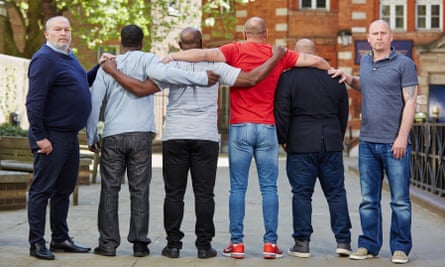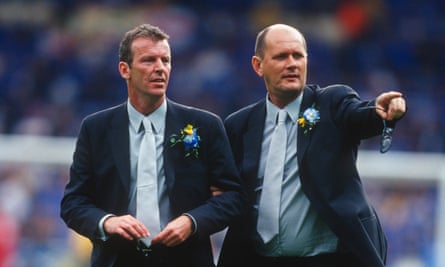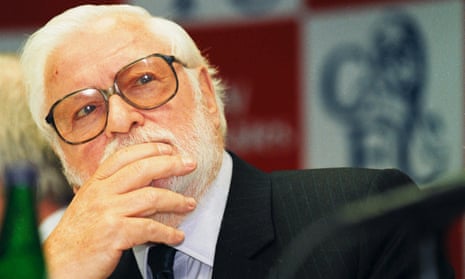Ken Bates, the Chelsea chairman when a number of youth-team footballers claim they were racially abused by their own coaches, has been accused of making “truly shameful” comments after criticising the alleged victims for wanting to keep their identities secret and questioning why they did not report it when they were children.
Bates suggested the reason for “all these ancient coming-outs so many years later” was because “the sniff of money is in the air” and said those in question should have found other clubs if the racism they allegedly encountered at Stamford Bridge, from the age of 11 onwards, was so upsetting.
Speaking publicly for the first time about the escalating scandal at his former club, Bates said Chelsea used to have some of the more racist fans in England, with the National Front using Stamford Bridge as their “unofficial headquarters”, and said he had taken the first measures to change the culture on the terraces. He did not offer any indication as to whether he believed the allegations surrounding Gwyn Williams and Graham Rix, two of his former employees. “Obviously I’m keeping an open mind about it,” he said.
Instead, Bates directed his criticisms towards the players with “their faces shielded, sitting with their backs to the camera”, and said that “what bothers me a bit” was the people in question choosing to remain anonymous. “I thought: ‘How are we going to make any progress? These people have to reveal their identities … and, without being unkind, what did they do about it at the time? If I’d been racially abused I would have told my dad and expected him to support me. Or I could have left the club and joined another one.
“It’s all very well to say, ‘Oh well, I didn’t want to say anything or do anything because it might have harmed my career’, but if you’ve got the ability there were plenty of other clubs snapping up young black kids.
“The sniff of money is in the air and I think in view of all the terrible miscarriages of justice over allegations of varied abuse – sexual, racial, etcetera – it’s time people should take a tough line. OK, name the people. Name the times. What was actually said? What was your response? This is trial by smear and it’s not good enough.”
The Guardian revealed in January that three former youth-team footballers from the 1990s had launched legal claims against Chelsea after allegations of explicit racism by their coaches, including one instance when Rix was said to have thrown a cup of hot coffee in the face of a young black player. Rix, who is also accused of other physical attacks, denies all the allegations.
One player’s evidence to the Football Association’s safeguarding department described it as a “feral environment” where black players in the youth team were treated “like a race of fucking dogs”.

Explaining why he felt unable to report Williams at the time, he said: “I knew it was unacceptable but I was a minor. When you’re in that position, where this guy is a powerful guy at the club … I didn’t know how to handle it. I thought it would stop. I just didn’t know how to handle it and it was constant … the racial slurs of ‘coon’, ‘wog’, ‘monkey’ … ‘smoking wacky‑backy’, which is marijuana, or ‘black bastard’, ‘fucking black bastard’, ‘mango‑muncher’, ‘nigger’.
“Gwyn Williams had been at the club since 1979. He was powerful. He was Ken Bates’s mate. The guy [Williams] is a walking piece of dirt but he had power. It was said he had the biggest black book in London – he knew everyone. That guy was the governor. No matter what role he had, that man had power.”
Since then, a number of other complainants have begun their own legal actions about the culture of “continued racist bullying and abuse” that allegedly existed when Williams was involved with the youth team. Two white players, Grant Lunn and Gary Baker, from Chelsea’s youth set‑up in the early 1980s have come forward to back their former team-mates and the club have brought in Barnardo’s to oversee an independent inquiry. Williams and Rix, who share the same solicitor, released a statement in January to deny all the allegations. They have declined a number of requests to speak about the matter.
Dino Nocivelli, a solicitor representing a number of complainants from the 90s, said: “Bates’s comments are truly shameful. For far too long, my clients felt they would not be believed and that the club would side with Rix and Williams, two coaches who held extensive power at Chelsea and over their football careers.
“My clients take particular offence to Bates criticising them for failing to disclose their identities and for these ‘ancient coming-outs’. The only thing my clients wanted to do as children was to play football and achieve their dream of becoming professional footballers. Instead, they suffered an alleged daily nightmare. These children are now men and, though it may feel ‘ancient’ to Bates, the pain and suffering these men feel is real and continues to the current day. My clients want the truth finally to be exposed.”
The first wave of allegations was so serious that Chelsea felt compelled to notify the Football Association and the police were brought in. The police decided after a seven-month investigation there was insufficient evidence to take any action. Chelsea’s last statement about the matter read: “We take allegations of this nature extremely seriously and they will be fully investigated. We are absolutely determined to do the right thing, to assist the authorities and any investigations they may carry out, and to fully support those affected, which would include counselling for any former player that may need it.”
Speaking to the Proper Sport Daily podcast, Bates described Chelsea’s response as “good PR” and said his former club had put out what they “would be expected to say”.
“But the reality is something different. If we’re going back to those days the whole of football was racist and the worst of all, I’m afraid, was the so-called fans. Chelsea was a very racist club generally and I’m talking about the fans. The National Front had an unofficial headquarters there. In fact, they used to meet in the pub across from the main gates and wait until the team was announced. If there were no black players in the team they’d walk across and buy their tickets. That’s how hate-filled it was.

“Chelsea were an all-white team, as were a number of other clubs in those days, and we were bringing black players through the youth ranks. We had one particular one, Paul Canoville, I remember he was named in the squad for the first time in an away game at Crystal Palace. As the players were warming up down the touchline, Paul Canoville was having bananas thrown at him.
“The next game we were at home. He was getting so much abuse from a certain section of the crowd I went down to the touchline and, as the final whistle went, I ran on to the pitch and put my arm around him. We walked off the pitch together as a show of solidarity – my way of telling the bad‑mouths what I thought of them. We had a small cheer from some sections of the crowd and that started it [the anti-racism campaign]. By the end of it, the ultimate irony is Chelsea were the first big club to appoint a black manager – [Ruud] Gullit – and had a number of black internationals.”
Bates went on to become chairman at Leeds and Williams, who had a variety of roles at Chelsea over more than 25 years, followed him to Elland Road to become the club’s technical director. Williams was dismissed by Leeds for gross misconduct in 2013 after emailing pornographic images of women to a number of colleagues, including a female receptionist.
